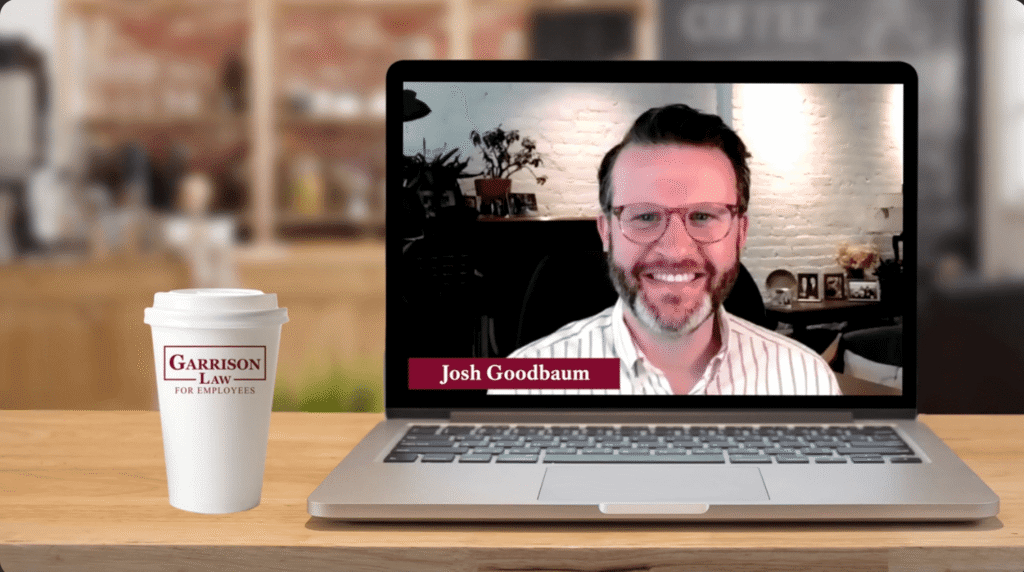Josh Goodbaum: Hi, Amanda.
Amanda DeMatteis: Hey, Josh. What are we gonna talk about today?
Goodbaum: I want to talk about the CHRO and the EEOC. Employment law is full of acronyms, a lot of them come from the government, and some of the big ones in employment law are the CHRO and the EEOC. So, tell our viewers, what are these combinations of letters, and why are they significant in employment law?
DeMatteis: Absolutely. So, the CHRO is the Connecticut Commission on Human Rights and Opportunities, and the EEOC is the Equal Employment Opportunity Commission. Great. Now, why does this matter for a potential plaintiff with employment law claims against their employer or their former employer?
The main reason is because you usually have to go through these agencies if you are a litigant that has employment law claims stemming from discrimination or retaliation, etc. But what does that mean?
Well, think about it like this: If a friend got into a car accident today and they suffered injuries as a result of someone else’s negligence, they can sue the person that caused that accident to recover damages for the harm that they caused, and they can do that by going to a courthouse and filing their complaint the next day. They have immediate access to our court systems.
When you are dealing with discrimination or retaliation at work, you usually don’t have that immediate access. You have to what’s called “exhaust your administrative remedies,” and the way you do that is through these two administrative agencies. If you have claims in state court in Connecticut, then you need to exhaust those through the Connecticut Commission on Human Rights and Opportunities. Likewise, if you think your employer is liable under federal law, then you need to process those claims and exhaust those administrative remedies through the Equal Employment Opportunities Commission.
Once you’re done with the CHRO and the EEOC, then you will get what’s called a release of jurisdiction, and that means the agency is saying, “Okay, we’ve done our part. If you want to go ahead and file your lawsuit now in court, you can do that,” and they give you 90 days to do it.
Our employee clients ask us, “Well, why do I have to wait to go to court?” The answer is you have to because it’s what our statutes tell us, right? You have to exhaust these administrative remedies.
The next question we get all the time, Josh, is, “Well, what do we have to do once we actually file in these agencies?” You have a duty to cooperate. So, what you will do is you’ll file your complaint with your lawyer, the other side will have an opportunity to respond to that complaint, and then you’ll be involved in what’s called a mandatory mediation, and you’ll have an opportunity – you’ll be required to have this opportunity – to sit down with the other side and see if there is a way to resolve your case. If it settles, great; then there’s no reason for you to go to court after that. If it doesn’t, you have the opportunity to stay within the administrative agency, whether it be the CHRO or the EEOC, and litigate your case to a conclusion there, or you can request what’s called a release of jurisdiction and go ahead and file in court.
How long does this process of administrative exhaustion take? It usually takes about 6 months. In fact, you are required, unless you can get consent from the other side, to have your claims go through the CHRO or EEOC process for 180 days.
Don’t look at this as a waste of time. Look at it instead as an opportunity. You’re going to exchange information with the other side through this time; you’re going to have an opportunity to settle the case through this period of time; and, most importantly, you and your lawyer are going to be able to strategize better and more concretely about what these claims are, what the damages are, because now there’s been some time from when the employment relationship ended, and you’ll be able to make some really good decisions about what to do next in your case.
So, takeaways in employment law: you’re stuck with the CHRO and the EEOC, but this is a good thing. Look at it as an opportunity. Litigation takes a long time once, and if your goal is to ultimately end up in court, you’ll get there.
Goodbaum: That’s great information, Amanda, thank you so much. Thank you all for watching, and we’ll see you next time.

